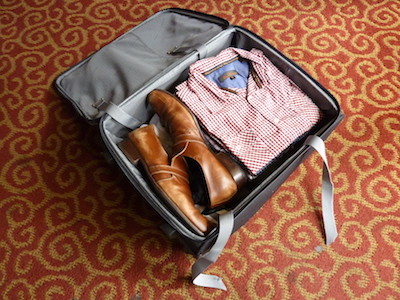10 Packing Essentials For Studying Abroad
With limited space available, one of the most challenging aspects of study abroad planning is figuring out what items to bring from home. For students who haven’t traveled out of the country before, especially on their own, it can be difficult to tell what they will need once they land in their host country.
Here is a list of ten packing essentials for studying abroad, according to a former student traveler. This list is not extensive and does not cover all of the items you are likely going to want to pack. Instead, these are things that you may overlook, but can provide considerable comfort and convenience once you get to your final destination.
- A backpack – A day trip-sized pack (~30-40L) that can fit a couple sets of clothes and basic travel items will be incredibly useful for when you decide to take weekend trips around the country or to other countries in the region. Make sure the backpack you choose is comfortable and fits well, just in case you end up having to stand or walk while wearing the pack for a considerable amount of time.
- Local currency – It’s a good idea to make sure once you arrive in your final destination that you have at least $100-200 in cash in the local currency. In order to get the best exchange rate, it’s typically best to wait until you land in your host country and make an ATM your first stop once you get off the plane. Having cash on you will be handy for small transactions you’ll need to make right away, such as getting lunch, or taxi/transportation costs.
- Documents (and copies) – Before you leave home for the airport, make sure you have all of your documents together and easily accessible (e.g. passport, visa, plane tickets, driver’s license, student ID card, itineraries). For security reasons, it can be a good idea to make copies of your most important documents such as passport, visa, and driver’s license.
- A week’s worth of clothing – In most circumstances, this will be a good amount of clothing to pack. One way to cut back on packing is to bring layered clothing so you can easily add or subtract to fit the needs of a wide-range of weather conditions. This will help you stay prepared for unpredictable weather in your host country, and will also make you prepared should you decide to travel to a different region where the climate might be different.
- Very basic toiletries – It’s only necessary to bring a small bag with basic travel-sized toiletries you may need for a layover and the first day or two once you arrive in your host country. When packing, keep in mind that it’s typically easy and convenient to purchase toiletries overseas. Leaving toiletries at home can help prevent having to worry about TSA restrictions on liquids, and also from items leaking in your bag onto your other belongings during air travel.
- An electrical adapter/converter – For the electronic devices you need to bring, it’s a good idea to bring both an electrical adapter and converter. Since electrical sockets are different around the world, you will need an adapter to allow your plug to fit into a wall socket or electrical outlet. Also, if you are bringing higher voltage electronic devices such as a hairdryer or laptop (in some cases), a converter will convert the voltage in order to function safely in outlets in another country.
- A WiFi-capable device – Bringing a WiFi-capable device such as a cell phone or tablet is beneficial for communication purposes. International data plans can be expensive, as can be making international calls from overseas with calling cards if you make calls frequently. Alternatively, WiFi is easy to find around the world in cafes, and you can use your device make phone or video calls from apps like Skype for free to another user or for cheap rates to a landline or cell phone.
- A lightweight travel pillow and microfiber towel – Bringing a travel-sized pillow and microfiber towel can be useful and practical, especially if you plan to take frequent trips and excursions while you are studying abroad. If you end up sleeping on a train or bus, having your own pillow will really come in handy. Also, not all hostels or hotels provide complementary towels, so having with you that is lightweight and dries quickly is a great way to be prepared.
- A journal – As noted in the article “Study Abroad: How to Prepare for Life in Another Country,” recording your thoughts and experiences in a journal can be a great way to track how your outlook and perspective evolve over the span of your time overseas. Also, a journal is a convenient way to keep track of new friends you meet, and for saving their contact information.
- A guidebook – Having a guidebook about your host country can be quite valuable for finding your way around the town or city, and for quick day and weekend trips to other parts of the country. When looking for a guidebook, try to find one that’s lightweight and compact so that it can easily fit in your backpack when you’re on the go.
Know your situation
Each student’s situation is unique, and each packing list will be slightly different depending on personal circumstances. The best way to customize your own ideal packing list is to know as much about your host country as you can in advance, and to try to find out which items will be readily available when you get there. Having this knowledge will help you figure out what you need to bring, and what you can leave behind.
Photo credit: Seemann/morguefile




